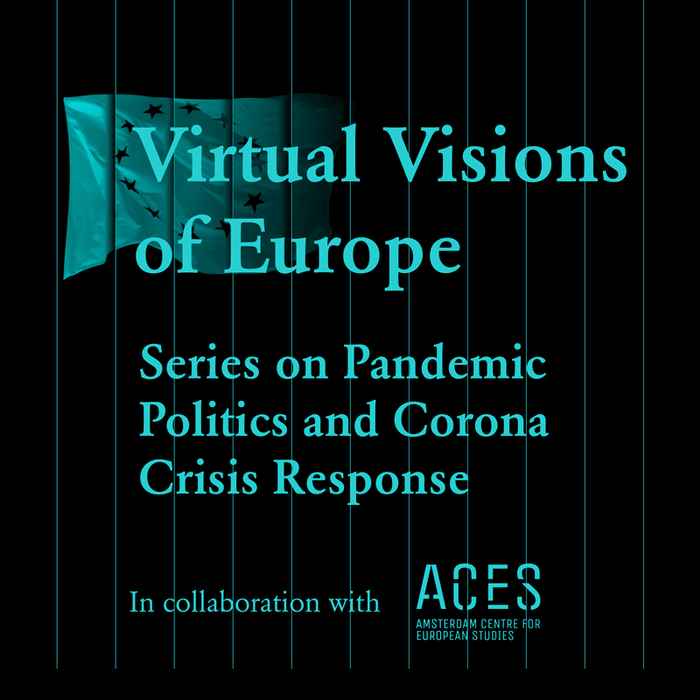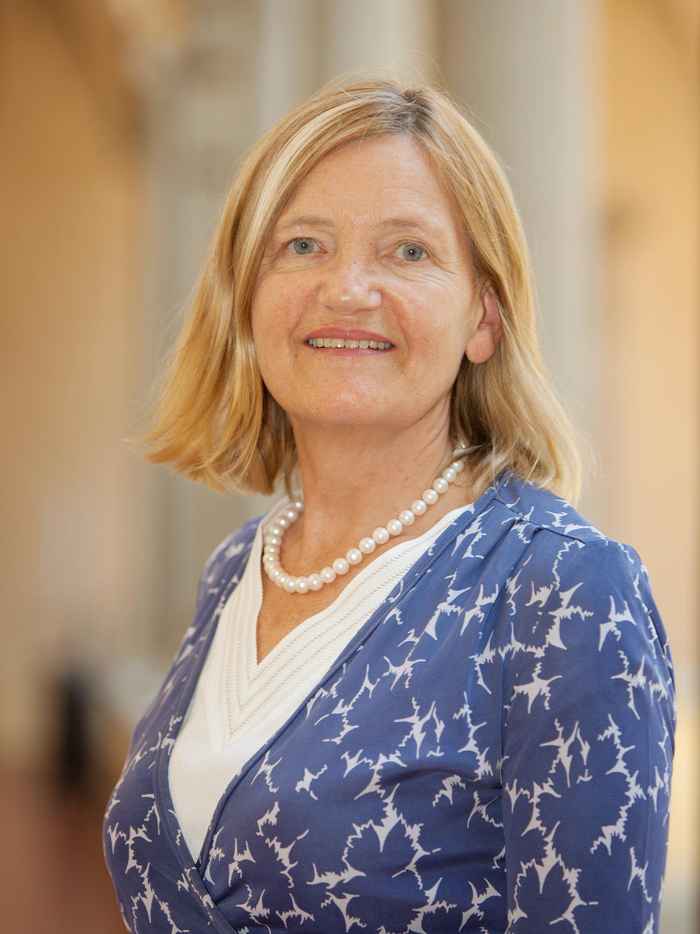Virtual Visions of Europe Lecture Series

The current Covid-19 pandemic confronts the European Union and its member states with unprecedented challenges. Public health ‘competition’ between countries instead of cooperation, leading to the closing of borders even in the Schengen zone. An economic slump unfolding on a scale not seen since the 1930s. Ever-increasing north-south and east-west divides in Europe.
These challenges come on top of the ‘polycrisis’ experienced by the EU and it members states over the past decade: first the financial and euro crises, then the refugee and migration crisis, followed by Brexit, alongside rising euroskepticism and attacks on the rule of law in a growing number of member states. At the same time, moreover, the multilateral global order within which the EU operates is increasingly challenged by the hostility of nationalist leaders such as Putin and Trump, but also the re-positioning of China in global affairs.

How will the European Union emerge from this crisis? Will the Union come out stronger, with a larger budget, more powers to coordinate public health measures, and reinforced solidarity within the Eurozone? Or will the EU’s inability to reach agreement and take the lead on critical issues in fighting Covid-19 result in a long-term weakening of its internal authority and external influence, or even a full-scale collapse of the European project, as Emmanuel Macron has warned?
This series is co funded by the Erasmus Plus Programme of the European Commission
Upcoming events
Currently, there are no upcoming events in this series.
Past events
-
Virtual Visions of Europe 1 | Public Health: Diversity and (Non-)Coordination
Public Health: Diversity and (Non-)Coordination
On procurement and distribution of medical supplies, and their implications for free movement and border controls – should the EU be given stronger powers? In this first edition of VVE experts discuss the procurement and distribution of medical supplies, and their implications for free movement and border controls within the EU. Should the EU play a bigger role/be given stronger powers, and if so of what sort?
Co-funded by the Erasmus+ Programme of the European Union
Speakers
- Maria Weimer – Associate Professor of European Law at the UvA
- Anniek de Ruijter – Associate Professor of European Law at the UvA
- Alessio Pacces – Professor of Law and Finance at the UvA
- Scott Greer – Professor of Health Management and Policy, Global Public Health, and Political Science at the University of Michigan
Moderator: Jonathan Zeitlin - Distinguished Faculty Professor of Public Policy and Governance at the UvA and ACES Academic Director
-
Virtual Visions of Europe 2 | Socio-Economic Policy and Crisis Response
Socio-Economic Policy and Crisis Response
What will be the economic and social impact of the pandemic? How are the EU and its member states responding? In the second edition of VVE we discuss new monetary and fiscal measures by the ECB and member states, the debate over solidarity, including the use of the European Stability Mechanism, the European SURE initiative for temporary (un)employment support, and the proposal for corona (euro) bonds.
Co-funded by the Erasmus+ Programme of the European Union
Speakers
- Frank Vandenbroucke – UvA University Professor
- Roel Beetsma – MN Professor of Pension Economics at the UvA
- Arnoud Boot - Professor of Corporate Finance and Financial Markets at the UvA
- Jean Pisani-Ferri - Tommaso Padoa-Schioppa Chair in European Economic and Monetary Integration at the European University Institute and Senior Fellow at Bruegel
Moderator: Jonathan Zeitlin
-
Virtual Visions of Europe 3 | The National and European Politics of the Pandemic
The National and European Politics of the Pandemic
How is the Covid-19 pandemic affecting politics at the national and European level? In the third edition of VVE we discuss how the corona pandemic is affecting politics, at the national and the European level. Is it producing cohesion or polarization among parties and public opinion? How are populist parties and leaders positioning themselves, with what results? How do these patterns differ across countries, and how can they be expected to develop going forward?
Co-funded by the Erasmus+ Programme of the European Union
Speakers
- Theresa Kuhn - Associate Professor of Political Science at the UvA
- Brian Burgoon – Professor of International and Comparative Political Economy at the UvA
- Sarah de Lange - Professor by Special Appointment – J.M. den Uyl Chair, at the UvA
- Catherine de Vries - Professor of Political Science at Bocconi University (Milan)
Moderator: Jonathan Zeitlin
-
Virtual Visions of Europe 4 | Changing Geopolitical Orders
Changing Geopolitical Orders
What are the implications of the crisis for the EU’s relationships with other global and regional powers? The fourth edition will shift the focus to the present and future challenges for the EU’s geopolitical role both in its immediate Neighbourhoods and in the wider world. What are the implications of the crisis for the EU’s relationships with other global and regional powers, most directly the US, Russia, China and Iran?
Co-funded by the Erasmus + Programme of the European Union
Speakers
- George Blaustein – Associate Professor of American Studies and History at the UvA
- Artemy Kalinovsky – Assistant Professor of East European Studies at the UvA
- Julian Gruin - Assistant Professor of Transnational Governance at the UvA
- Heinz Gärtner - Professor of Political Science at the University of Vienna
Moderator: Luiza Bialasiewicz
-
Virtual Visions of Europe 5 | W(h)ither the EU?
How will the EU emerge from the crisis?
The VVE series concludes with a discussion on the implications of the crisis for the EU in general. Will the EU emerge stronger from the crisis, e.g. with a larger budget, more powers to coordinate public health, and reinforced solidarity within the Eurozone? Or will the EU’s inability to reach agreement and take the lead on critical issues result in a long-term weakening of its internal authority and external influence?
Co-funded by the Erasmus + Programme of the European Union
Speakers
- Jonathan Zeitlin - Distinguished Faculty Professor of Public Policy and Governance at the UvA and ACES Academic Director
- Frank Vandenbroucke - UvA University Professor
- Theresa Kuhn - Associate Professor in Political Science at the UvA
- Erik Jones - Professor of European Studies and International Political Economy at Johns Hopkins SAIS in Bologna
Moderator: Christina Eckes
Virtual Visions of Europe continued
Following on from the success of the first five Virtual Visions of Europe events, the series has been extended to include events that look beyond pandemic politics and the coronavirus response to visions for Europe’s future. In these events, we look into the potential of a green transition under the European Green Deal, the EU’s response to Brexit, and how to construct a hopeful future from an “age of unpeace”.
-
Visions of Europe 6 | The EU Green Deal
A Green Energy Transition?
The European Green Deal is the flagship initiative of the von der Leyen Commission to meet the existential threat of climate change and environmental degradation by transforming the EU into a modern, resource-efficient economy, ensuring no net emissions of greenhouse gases by 2050, economic growth decoupled from resource use, and no person and place left behind. Does this deal respond sufficiently to the need for a green transition? What role can it play? And what are the challenge of the 2021 Climate Summit in Glasgow?
Speakers:
- Tony Agotha - senior diplomatic advisor to the Executive Vice President of the European Green Deal at the European Commission
- Moderator: Jonathan Zeitlin
-
Visions of Europe 7 | EU Collective Power in Action
The EU’s response to Brexit and the Covid19 pandemic
Since the outbreak of the global financial crisis in 2008, that morphed into an existential crisis for the single currency, the EU has been beset by crises amounting to a polycrisis. How can we understand the EU’s response to these crises? What were the roles of political actors and collective institutions in delivering enhanced capacity in this response?
Speakers:
- Brigid Laffan - Emeritus Professor at the European University Institute
- Moderator: Jonathan Zeitlin
-
Visions of Europe 8 | The Age of Unpeace
How Connectivity Causes Conflict
We thought connecting the world would bring lasting peace. Instead, it is driving us apart. In the three decades since the end of the Cold War, global leaders have been integrating the world's economy, transport and communications, breaking down borders in the hope that it would make war impossible. In doing so, however, they have unwittingly created a formidable arsenal of weapons for new kinds of conflict. In his new book, Mark Leonard argues that rising tensions in global politics are not a bump in the road - they are part of the paving. How can the EU respond to these challenges? And how might we construct a more hopeful future from an age of unpeace?
Speakers:
- Mark Leonard - co-founder and director of the European Council on Foreign Relations
- Thijs van der Plas - Director General for Political Affairs at the Dutch Ministry of Foreign Affairs
- Moderator: Luiza Bialasiewicz
-
Visions of Europe 9 | The EU response to Brexit: Rapid, United, Effective

Brigid Laffan The EU response to Brexit: Rapid, United, EffectiveThe outcome of the UK referendum on 23rd of June 2016 represented a major shock for the European Union (EU). A large member state opted to exit the EU, the first member state to do so and all actors feared a domino effect and EU disintegration. This is not materialize. The response of EU 27 was rapid, united and effective.
Speaker: Brigid Laffan | Date: 9 May 2022